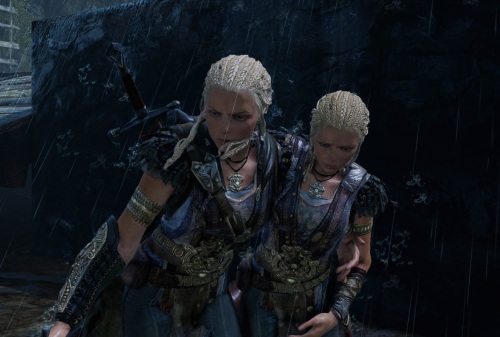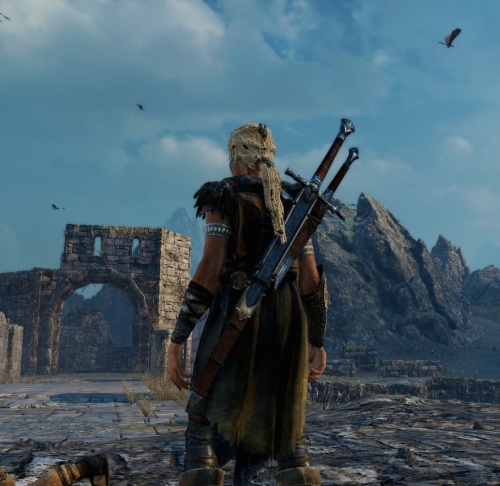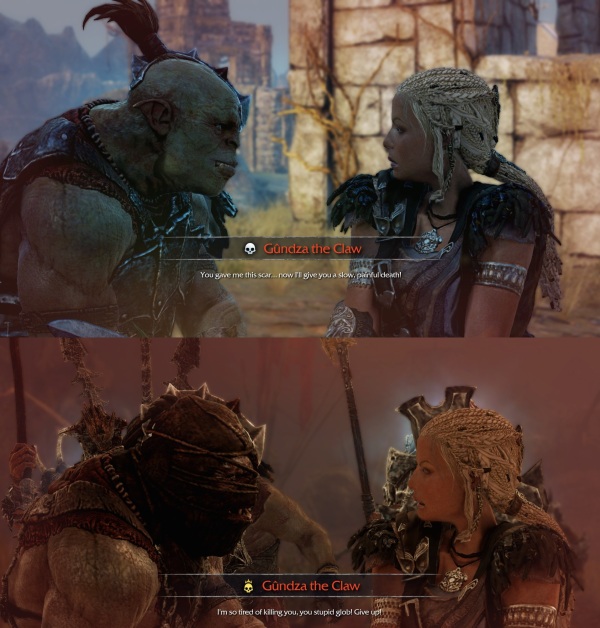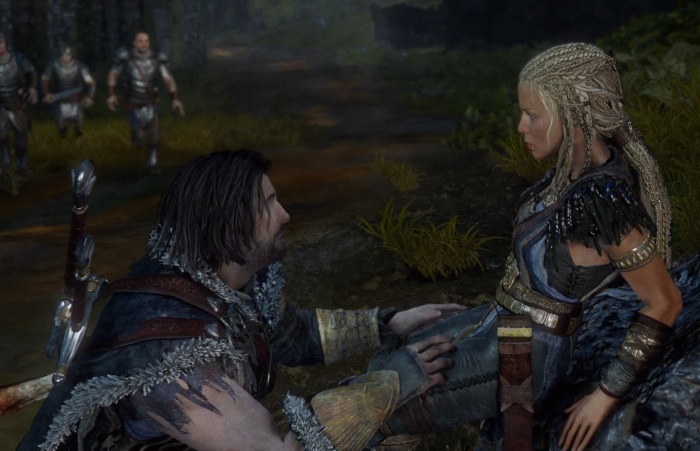There was a lot of discussion this year, thanks in no small part to Bayonetta 2, attempting to define the “female power fantasy” in gaming. Bayonetta is a fitting character upon whom to center this conversation, given that she is both strong physically and also sexually intimidating in a way that seems designed to at least poke fun of, if not all out terrify, the male gamers who would typically ogle and otherwise degrade a character who looks and acts like Bayonetta. Yet, oddly enough, this year I found my example of a female power fantasy in a video game whose fantasy was quite clearly not supposed to be “for me” – Shadow of Mordor.
A so-called female power fantasy can never exist in a vacuum – it will always be influenced by the patriarchal norms that inform what we believe makes women powerful. So while I appreciate and agree with Maddy Myers’ assessment that Bayonetta’s overt sexuality does not necessarily mean that she is defined by the “male gaze” (maintaining all of Maddy’s reservations about that term) or that Bayo exists as a sex object for the player, Bayonetta doesn’t work as a power fantasy for me specifically because much of what the game displays as being powerful about Bayonetta hinges and is dependent upon her sexuality. There is nothing fundamentally wrong with this, and Maddy points out that perhaps our unwillingness to value sexual power as highly as other forms of power is rooted in puritanical American squeamishness, if not also our historical tendency to assign scary sexual power to women. But for me, at least, a power fantasy that is rooted in sexual power is still not a fantasy that feels as if it is “for me” when sexual power is practically the only way in which characters who share my gender are allowed to be powerful. My idea, as a woman, of a power fantasy is a world in which I can have the types of physical power that narratives often exclusively assign to male characters – essentially, a world in which my gender is largely inconsequential to the power I can achieve.
Shortly after Shadow of Mordor‘s release, Carolyn Petit rightfully took the game to task for its disgraceful treatment of women characters. Of the five women characters in the game (and I say five women characters, not five named women characters because there are no women in this game aside from these five), three must be rescued from various forces of evil during the course of the game’s story, and the other two are murdered in front of their respective husbands in order to give their husbands proper revenge motives. Carolyn is completely right – Mordor’s treatment of women is despicable and brings an already simple and cliché story down even further. But since I was already aware of the largely negative reviews Mordor’s story had received when I purchased the game, and because I have a deep-seated hatred of all things Tolkien, my likelihood of enjoying the game’s story was in no way a factor in my decision to buy the game. Like so many others who have wanted to try Mordor, I was here for the Nemesis System.
Pictured above are one of my first and my final meetings with Gûndza the Claw. Gûndza and I met very early on while I was playing Mordor, early enough that I didn’t fully understand when it was best to cut my losses and run, or at least to get to higher ground and make a more strategic attack. Consequently, I was killed repeatedly by Gûndza and one other Uruk captain who always managed to show up to the fight (I can only assume they were BFFs) during my first few hours of gameplay. Soon, they were each level 20 captains who still always showed up in a pair anytime I attempted to go after one of them. I killed Gûndza’s friend first, but the next time I fought Gûndza, his friend had returned from the dead. Then I killed Gûndza, but he reanimated when I next faced his friend. For a long time, I was convinced that the game was not going to allow me to kill the pair unless I killed them both at exactly the same moment. Every time I managed to kill either of them, and it took several times before they stopped coming back, I yelled at my computer in satisfaction. Simply put, I fully enjoyed what the Nemesis System had to offer, but my enjoyment stemmed less from the Uruk characters themselves than their interactions with my character.
Look at how Gûndza threatens me in the two scenes pictured above. He is annoyed by my resilience in the bottom picture – practically a compliment – and utters one of the more violent threats in the game in the top picture, saying that he plans to kill me slowly and painfully. Gûndza’s threats, particularly the bottom one, are directed toward a worthy adversary. The Uruks in Mordor consistently treated my character as an equal in combat skills. Sometimes they mocked me, but often it was clear that behind those jabs was a fear of the stories they had heard about me from the rest of their army. And never once in the game did these supposedly evil and bloodthirsty Uruks threaten me by way of gendered slurs or sexual violence.
Now, there is a very good reason for this and it cannot be attributed to Monolith’s intentional desire to make me, as a woman player, feel more comfortable playing their game. While it appeared as if I played as a woman, in fact I never played as anyone but Talion, the game’s male protagonist. Lithariel is a character in the game’s story, one of the women Talion has to save, and with a free DLC pack that is now downloaded automatically upon purchase of the game, you acquire a Lithariel skin. Lithariel’s skin has none of her own voice acting, uses all of Talion’s animations, and does not appear in cut-scenes. If you think this sounds immersion breaking, you are absolutely correct – although I quickly found myself thinking of my Lithariel as a largely silent mercenary who was hired by two whiny men to do the heavy lifting in their boring revenge plot. She listens to them conspire and take credit for the battles she fights, but never particularly cares as long as the pay is good.
Regardless of any headcanon I imagined for my version of Lithariel, the game itself – and by extension my enemies, the Uruks – never thought of me as anyone other than Talion. As such, I was happily free of the common threats of sexual violence and use of slurs that often accompany a “strong female character” when such a character is allowed to be a part of a video game’s narrative. Lara Croft in the Tomb Raider reboot could conceivably have worked well as a female power fantasy, if not for the constant feeling the game reinforces that, if I allowed Lara to die, she would be in immediate threat of assault at the hands of the Solarii. Tomb Raider‘s enemies consistently threaten Lara with slurs, and one of their members does assault Lara early on in the game – the catalyst that supposedly makes her capable of killing a human for the first time. Even the game’s simple insistence that the Solarii refer to Lara as “girl” throughout the game stole away some crucial aspect of her power. While the Solarii become increasing wary of Lara as the game progresses, their early threats constantly reminded me of the specific type of danger that Lara, as a woman, faced and made it impossible for me to fully enjoy her rise to power. Video game narratives that insist upon the use of gendered slurs and sexual threats to amp up the perceived stakes will never function as power fantasies for me, because they are too deeply rooted in a world that consistently demonstrates the ways in which I have less power because I am a woman.
In Mordor, my Lithariel walked like a battle-hardened warrior. She fought like an expert. She was never degraded by enemies who sought to find ways to terrorize her that were specific to her gender. And all this was only possible because the game knew she was really Talion – a man.

This was never more apparent than when my Lithariel was tasked with rescuing herself from an Uruk stronghold. I was stunned at the differences in the two models when I viewed them side by side. My Lithariel had a slightly larger frame with an entirely different walk and fighting style. The game’s Lithariel is supposedly an experienced general and fighter, but she quickly finds herself and her forces overwhelmed when they attempt to storm the Uruk’s stronghold. My Lithariel wiped out that same stronghold single-handedly.
Or, more accurately, Talion did.
So I cannot praise Monolith because it unintentionally created a universe in which I was able to play a strong and capable woman warrior, though Mordor remains the closest I have come in a very long time to understanding what a female power fantasy would look like to me. Bayonetta is a fascinating character and a perfectly valid example of what women’s power fantasies can look like in video games, but the ways in which her power is inextricably tied to her sexuality simply serve to remind me that she is woman first and powerful second. Saints Row IV goes to great lengths to ensure that the Boss acts the same and is treated the same by all the other characters regardless of gender, but I can’t shake my unease that two of titles that have done the most substantial work in this arena have both been comedies. Comedies are in no way inferior to their dramatic counterparts, but powerful women in video games should not be confined solely to comedic narratives.
The key to my female power fantasy is simple. Let me play as a woman, but do not change my character’s speech, movement, or fighting style to fit your definition of “feminine.” With all due respect to Bayo’s fantastic moves, I would much prefer to play as Lithariel, wielding a heavy broadsword with grace and skill. Above all else, allow my female character to inhabit a world in which merely existing as a woman does not mean she is subject to additional fears or threats that her male counterparts never have to see. The real world is scary enough for women – why would we want those fears to follow us to our fantasies?



This is a great post! Continuing on the swords-and-sorcery beat, I found that Dark Souls (and its sequel) did a pretty good job of letting the player be a woman without any difference in how the world treats you. The player model’s animations are subtly different without feeling at all exaggerated. On the flip side, while Skyrim did a fair job of providing a mostly gender-neutral experience, all female character models (player and NPC) had the same prancy walking animation, which always felt out of place for the player character. It’s sort of a minor detail, but it still detracts from the experience.
Just a post to put in place my POV of the game:
I think that some of the points you’re saying about the women in this game are wrong: for example if on the five women three are saved and two killed, it’s the same with the male characters: on fourth male-named characters two are saved by Talion and two died to put in place the revenge’s side. Moreover with the slaves, who rarely fight and always need to be saved.
It’s explained with the narrative: Talion’s got the “spirit” power, he’s not human, he’s surhuman. So it’s normal that every humans (or dwarf) need help, cause they’re outnumbered seeing the hordes of Sauron, it’s one of the main point of the narrative.
I don’t think it’s an hidden way to putting a supremacy of the men over women.
So I didn’t find Lithariel as a pro-patriarchal character, also I haven’t done all the mission with her.
Concerning the skins it’s the mark of Warner Bros Productions: they did the same with the Black Hand’s skin and with the Batman’s game. It is explained to make lights costs, (not adding more work on the cinematic and dubbing I guess. )
Still a review I appreciated for your point of view about it.
Great post, though it also makes me sad that the best example of a female power fantasy involves (somewhat half-assedly) reskinning a male character. It seems like most of the games that involve a strong, ass-kicking female also feel the need to use gendered threats and insults against her.
Have you played mass effect or dragon age? You can create a female character and they are never treated like less than just because they are female.
Sometimes it seems like I’m the only woman alive who doesn’t want to be an all consuming sex goddess like most “strong women” in games and movies that are portrayed as the height of female power. Seriously….yawn. I wish I could believe that these characters were not written for the male gaze and fantasy, and I’m sure there are some women out there who might like them, but I know they aren’t written for me.
Im constantly reminded at work everyday that I’m a woman and it can suck. I can see the way people look at me and assume my knowledge level. I like to make the men who come in and ask for a “tech expert” uncomfortable. I try to pretend I don’t understand why they don’t just tell me their problem instead of looking around for someone else. It makes me giggle to see them stumble for words that will hide their discomfort at trying to explain why they don’t think I’ll know anything about their problem.
In my power fantasy, I put on a full suit of armor with a helmet and beat their stupid heads in with their own iPads. They don’t get a chance to realize I have tits.
[…] also read a really awesome article about Shadow of Mordor (prompting me to pick up the game, finally) by my partner-in-crime Tzufit. […]
Absolutely outstanding post, hot damn. The only thing I somewhat disagree with is the bit about Tomb Raider: The Solarii referring to Lara as “girl” and being sexist shitbirds actually made drastically kicking their asses more meaningful to me, both in story and gameplay — especially later on in the game when they start actually fearing that “girl.”
Oh, actually, one other thing: the story is actually kind-of brilliant, in that contrasted to Tolkien’s work, suddenly the Uruk have their own stories and personalities: you come across Uruks who genuinely don’t even want to fight, and are scared, etc. There are Uruks with actual relative depth. There have been a few pieces written on how — and this is pretty damn subversive in the context of Tolkien’s work — this time around the generic white, gruff beefcake is essentially a terrorist & one-dimensional instead of the Uruks; it’s the Lord of the Rings films’ dynamic turned upside down.
Did you even read the book? there is a whole chapter named something like “The Uruk hai” (did only read it in german, so not sure about the actual name – should be in the second book, if I remember correctly), and its one of my most beloved chapters, because you get to know those evil orcs, although they are not the same as the “normal” orcs, because they are Sarumans and so on, but you will probably dont understand a thing of this, so ill let it be. ^^ (btw later on there are even more individual orcs, but no uruks)
but what I mean: Tolkien made it very clear that orcs are individuals. So thats not new, and I just couldnt let you get off with this unnoticed. 🙂 no offense
ps: perhaps you are referring to the films? well that would be a whole new thing, and you would be pretty spot on, but than thats not tolkien and a huge difference!
See, I always thought that was kind of the point… of course when a strong female comes along there will be men/antagonists that doubt her and denigrate her. Them doubting you is supposed to make it that much more satisfying when you defeat them and/or outsmart them. I’ve always assumed that that’s why that happens in games, movies, books, or whatever medium; with 90% of that type of story crafted by men the intention isn’t to take women down a peg, it isn’t to say ‘hey, you can be successful and strong too but you still will be doubted unlike a man,’ the point is to craft believable villains that you thoroughly enjoy defeating then rubbing their nose in how wrong they were (if they still live).
You can criticize it by calling it lazy writing, I think, relying on the all-too-easy troupe of just making your villains sexist (or racist) rather than creating a more original and compelling villain(s), but I don’t see why that should be taken as anti-female; sure, they think you aren’t good enough, but in the end, you defeat them. Isn’t that the point? Silencing doubters?
[…] data are rote copied, subtext will change under the stress of recoding gender (Tzufit. “A Mile In His Shoes: Playing Shadow of Mordor as Lithariel as Talion.” Pop Culture Coven. Dec 30 2014.). Alternatively, the unwritten rules dictating how a […]
[…] really want Shadows of Mordor, both because the game is apparently great and because I really like this blog post by Tzufit on playing the game as a lady character. The game is maybe a year old and dropped to $25 during the […]
well, you could argue this is a little bit old, but im just now startin to get on this game, and therefore I came here because I wanted to know if I could play the game as that “female skin” ^^ (I know that sounds awful:D) Anyway I am male, and i dont know why, but I have for instance (and not only) played Skyrim and Mass Effect as the/a female protagonist. To me me its much like Nikita, Resident Evil, Alien and films/stories like that, that I just find the female heros more likeable than those mainly bodybuilder/asshole-like males. Thats just not me, and besides that I dont! want to play Me (got that in RL already ^^) – so I feel very comfortable following the story of a female protagonist. ( or if there is one: the story of a male protagonist, but not mine! – so I guess thats the reason for me picking the females often, not always)
I am hetero, just in case you wonder ^^, and yes I am aware of the fact, that (not only) in entertainment the point of view – even with female protagonist – is mainly a male one. I´ve heard of Freud. 😉
just wanted to let you know of the different PoV´s on this.. 😉 cheers
btw: I still dont know, if I should play as that girl, because it sounds a little schizophrenic playing as 1 and getting cutscenes from another, but perhaps im gonna go with that mercenary-thingy-attitude you mentioned/imagined, sounds legit ;).
and pps ^^: I would love to see more games from a more female point of view, but actually whenever it is about action (in whatever genre you want to pick) the female protagonist has to a certain degree to behave like a cliche male, because thats what heros are all about, unfortunatly (system-immanent?). So goes the saying at least ^^. I would love to see the difference in a more truly female hero, if there is one. Because I mainly think the difference between male and female in storytelling! (as protagonists) is not that great. But I am very open and wanting for a dissaproval!
[…] really want Shadows of Mordor, both because the game is apparently great and because I really like this blog post by Tzufit on playing the game as a lady character. The game is maybe a year old and dropped to $25 during the […]
#latetotheparty I just got this game and am already deep in the Uruk ranks. I’ve been playing as the Lithariel skin as well (because close your eyes and throw a rock and you’ll hit a male protagonist) and loving it. It feels like playing Eowyn as she was meant to be in her own self assessment.
That (my) Lithariel walks like a caveman, talks like a bad 90s romcom villain, and takes on form during cutscenes is… fine. It is, as you say, halfassed but sufficient with enough subjective conviction.
I had not, until reading this, been able to put my finger on why it has been so much more enjoyable as the Lithariel skin [I confess, as a man, I had (hopefully forgivably) given little previous thought to the subject of female power fantasies in gaming] but it is quite clear now.
My hope is that in the upcoming sequel there is room for gender parity for the protagonist, perhaps as Dishonored 2 achieved with its character choice at the beginning of the game.
A very belated thank you for your insightful post and I look forward to exploring more of your site.
I frequently switch between Talion and Lithariel during my playthrough, and I also think that the lack of V.O. breaks immersion, but if you look closely, the animations are slightly different. Not going to go into full detail with that, but I have a fun idea I use to increase immersion, which is to alter my playstyle between characters. As Talion, I’m quicker and more brutal with my combat, and I’m more up-front and aggressive when I attack strongholds, while also making full use of the Wraith. As Lithariel, I make my combat and fighting style more graceful, smooth, and quiet (if possible). I take a more strategic approach when I attack strongholds, usually choosing to rely on stealth, and I don’t jump from high places, but I climb down instead. Why? Not because Lithariel is a woman, but because her actual canon character is mortal, meaning death should be taken more seriously. I penalize myself if I die as her, mostly by switching to Talion and avoiding switching to her for a set amount of time. I avoid using the Wraith at all when playing as Lithariel, and I don’t interrogate my enemies, because that counts as using the Wraith. Instead I gather intel by looking at the files in camps. To reiterate, Lithariel being a woman has nothing to do with my chosen playstyle when controlling her. Changing playstyles between the two characters helps me convince myself that I’m actually playing as a different character. I gave Lithariel the climbing limitation because landing a high fall counts as using the Wraith. As for hiding in bushes, I try not to do that Lol. Limitations such as climbing slower/No high jumps and avoiding Wraith usage is fun, because it adds a new experience when playing as Lithariel. The uruk dialogue doesn’t break immersion as much, because my nemesis refers to my character as “My Sweet” regardless of gender. Do any of you agree with how I handle the immersion issue? Discuss.